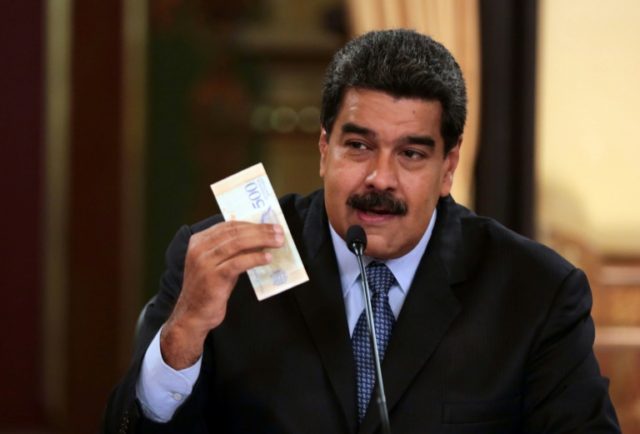American megabank Goldman Sachs is likely to lose heavily on their controversial purchase of Venezuelan bonds, according to an analysis by the Wall Street Journal on Monday.
According to the Journal, “Mutual funds operated by Goldman Sachs Asset Management faced potential losses of at least $63 million on the bonds in the 12 months ended June 30,” while all told market-value losses on the investment are likely to exceed $250 million.
The significant losses come after Venezuelan dictator Nicolás Maduro announced a 96 percent devaluation of the country’s bolivar currency alongside a number of other economic reforms such as increasing the national minimum wage by 3500 percent. Most investors believe this will only further weaken the country’s economy by increasing unemployment and plans to increase government spending, with inflation expected to top one million percent by the end of 2018.
Goldman Sachs purchased around $2.8 billion in Venezuelan bonds last May in a move that was immediately criticized by democracy activists who pointed out that such money would go straight into the hands of Maduro’s socialist dictatorship, responsible for egregious human rights abuses.
Congressional leader Julio Borges accused the bank of trying to make a “quick buck off the suffering of the Venezuelan people,” a concern the company did not publically address in detail.
“We recognize that the situation is complex and evolving and that Venezuela is in crisis,” a spokesperson said at the time. “We agree that life there has to get better, and we made the investment in part because we believe it will.”
Goldman successfully sold some of their bonds to hedge funds at a profit, although the value of the bonds has fallen from 31 cents.
The opportunity for American companies to invest in Venezuelan bonds is no longer possible after President Donald Trump approved sanctions last August banning Americans from dealing in Venezuelan government debt or that of its state-run oil company Petroleum of Venezuela.
The Maduro regime has since tried to raise funds through the creation of a national cryptocurrency known as the “petro,” pegged to the country’s sizeable reserves of oil, gold, and diamonds. The idea created limited interest among American investors, although the White House later prohibited its purchase as part of the administration’s effort to squeeze the Maduro regime out of power.
Follow Ben Kew on Facebook, Twitter at @ben_kew, or email him at bkew@breitbart.com.

COMMENTS
Please let us know if you're having issues with commenting.